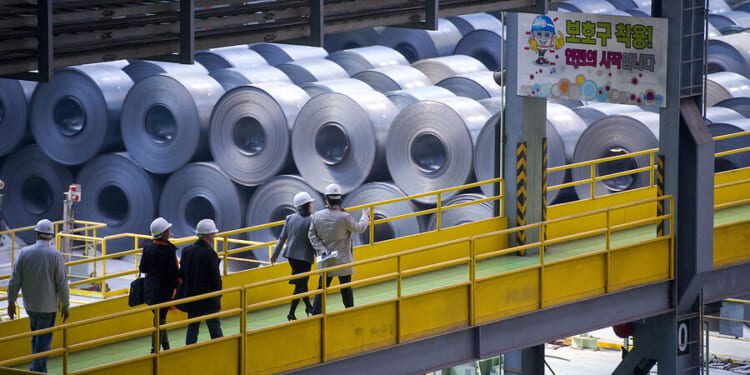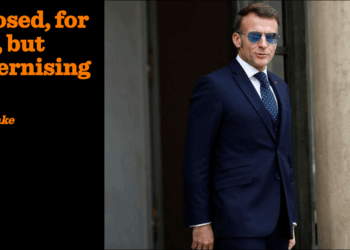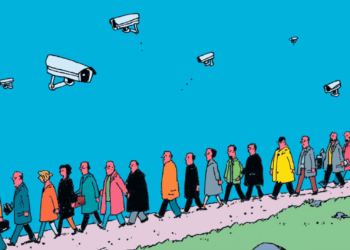A slab of red-hot steel shoots down a track, loud as a steam train, in a multistory hangar at the sprawling Hyundai steel plant in Dangjin. The machinery, cooled by constant streams of water from an artificial lake, hisses and clangs as it produces hot steel coils, a crucial component in automobile manufacturing, bridge-building, and other industries around the world.
Hyundai Steel is set to construct a factory just like this in Donaldsonville, Louisiana. It will support the Hyundai Motor Group’s growing manufacturing projects across the American South and satisfies the Trump administration’s “America First” agenda by creating hundreds of local jobs.
But that’s assuming the South Korean company can convince its technicians to go to Louisiana after a high-profile raid at a Hyundai battery plant in Georgia on Sept. 4 rattled the Korean public, who felt their workers – and, more broadly, their country – were owed more respect.
Why We Wrote This
The raid by U.S. immigration agents on a Hyundai factory in Georgia has done more than short-term financial damage. It has amplified South Korean frustration with its American ally.
Long labeled a “shrimp among whales” in northern Asia, South Korea has advanced dramatically over the past few decades, becoming a leader in arms, shipbuilding, and technology. When the United States threatened to raise tariffs on Korean exports this summer, the government verbally agreed to invest $350 billion to revive American industries. South Korean President Lee Jae-myung, on a trip to D.C. in August, promised to “Make American Shipbuilding Great Again.”
But the raid in Georgia has stirred up old frustrations with U.S. relations, and cast a shadow over deadlocked trade negotiations between the two countries. The tensions threaten to spark a new wave of anti-Americanism on the peninsula at a time when Seoul has been growing closer to Washington.
There’s a sense that not only is the U.S. demanding too much from the middle-power country, but also that it’s not repaying that investment with the level of respect expected by Koreans. “South Koreans were really shocked when they saw how badly treated our workers in Georgia were,” says Jeonghun Min, a professor specializing in American politics at the Korea National Diplomatic Academy.
He believes trade and investment deals are still salvageable. “But it depends on how you treat your ally, and their workers,” he adds. “They should be treated fairly.”
“A matter of identity”
Since the late 1800s, when the kingdom of Korea and the United States established formal diplomatic relations, waves of anti-Americanism have shaped the politics of the peninsula. In recent history, the presence of U.S. troops – stationed there for more than 70 years to deter North Korea – and issues of burden-sharing between the U.S. and the Republic of Korea have been especially contentious, challenging the U.S.-Korea security alliance put in place after the Korean War.
As South Korea’s economic development and democratization has turned the country into something more akin to a “dolphin” – not a massive powerhouse like China or Russia, but certainly no shrimp – the U.S.-Korea alliance has remained imbalanced, says Gi-Wook Shin, a professor of sociology at Stanford University and author of “One Alliance, Two Lenses: U.S.-Korea Relations in a New Era.”
“Korea, frankly, is not as important to the United States as most Koreans believe,” he says. “For Korea, the U.S. is more than a policy issue. … It’s a matter of their identity.”
Since the end of the Korean War in 1953, U.S.-Korea relations have been one of the most polarizing issues dividing Koreans. Traditionally, in Korea, conservatives are pro-America, while progressives are more critical of the U.S.-Korea alliance. Recently, this has been changing.
Waning trust in Beijing, combined with growing pressure to choose between China and the United States, has pushed more Koreans toward Washington. Meanwhile, analysts say South Korea’s previous government, led by impeached President Yoon Suk Yeol, pulled the entire political spectrum right, moving many progressives to the center.
Mr. Lee, a progressive who won a snap election in June, has thrown his weight behind the U.S.
His August trip to Washington showcased the Korean president’s diplomatic savvy, exceeding analysts’ expectations. He kept meetings with U.S. President Donald Trump cordial and affirmed the importance of the U.S.-Korea security alliance. His proposal to “Make American Shipbuilding Great Again” was well received by American officials. After the summit, politics watchers set their sights on October’s Asia-Pacific Economic Cooperation summit as the next opportunity to make bilateral progress.
Then the raid happened.
A fair share
On Sept. 4, hundreds of federal agents descended on the semi-constructed Hyundai and LG battery plant in the quiet town of Ellabell, Georgia. They detained nearly 500 workers – most Korean nationals, many of whom had overstayed work visas – leading them out of the blockaded factory in handcuffs and ankle chains. It’s the administration’s largest immigration sweep to date.
In South Korea, the backlash was immediate.
Trade unions are demanding an apology from President Trump. The Korean government has launched a probe into potential human rights abuses. And among the hundreds gathered at Incheon International Airport to welcome home the returning workers on Sept. 12, several demonstrators held banners decrying U.S. “backstabbing.”
The day before the detained Hyundai workers were set to depart for Seoul, Mr. Trump offered to let them stay and continue training American staff. All but one chose to return to South Korea.
It’s not just Hyundai projects on the line. Several Korean companies, including Samsung Electronics and Korean Air, have previously announced plans to invest in U.S. semiconductors, battery manufacturing, automobiles, aviation, and shipbuilding.
When the Georgia raid happened, Seok Jong-gun, minister of South Korea’s Defense Acquisition Program Administration, thought of Philadelphia shipyards where Korean workers provide training services. If they run into trouble, “this would definitely undermine the partnership in the defense industry and acquisition between the two countries,” he says.
The raid has put more scrutiny on the $350 billion investment and whether South Koreans will see a fair share of the profit.
Mr. Lee has said that accepting Mr. Trump’s demands could lead to his impeachment – or a repeat of the 1997 financial crisis – and vowed to “not accept any irrational or unfair” trade deals.
The coming weeks will be a test of President Lee’s capacity to negotiate with the Trump administration while preserving cohesion at home.
To “get away from the [shrimp] mentality,” says Stanford’s Professor Shin, “you have to create consensus, at least in terms of dealing with the big powers.”
But “if something like this happened again and again, I think Korean progressive forces could lose patience,” he adds. “That will really be a challenge for the U.S.-Korea alliance. … I’m very concerned that we may be reaching a tipping point.”
This reporting was supported by the East-West Center.















